In Kyoto the number of shrines and temples is enormous.
I went to the very very famous shrine which is well known as “Senbon Torii” Fushimi Inari for the first time in my life.
I wanted to come and think for a long time but didn’t go so I decided to go this time.
Fushimi Inari is one of the photogenic spots in Kyoto and the shrine is also known as “O-inari-san”.Inari shrines are the most familiar shrines to Japanese people. The main shrine is registered as an Important Cultural Property, several power spot is located inside the Fushimi Inari shrine, a well-known spot and Inari-yama toughness info will be shared here.
Kyoto Fushimi Inari Taisha (shrine)
Most people will imagine “Senbon torii” when they hear the shrine name Fushimi Inari but this Senbon torii will be introduced later.
Senbon means one thousand.
Inari shrine is well known as “O-inari san” which is commonly called fox in Japan. In Japan “O-inari san” shrine has more than 30,000 and Fushimi Inari Taisha is the head shrine with which all the others are affiliated.
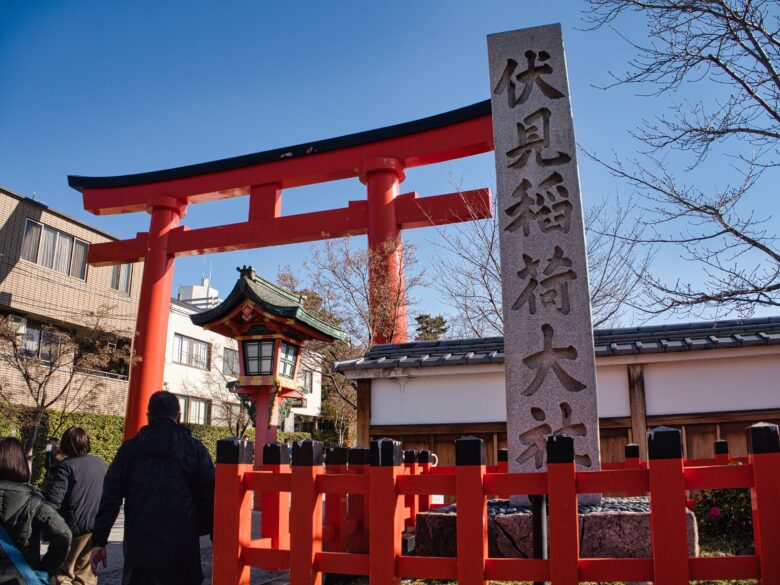
Fushimi Inari Taisha which is famous as the god of business prosperity and fertility, has not only the Senbon Torii, but also the Okumiya behind the main shrine, Inariyama, believe that the power spot to make your dream come true “Omokaruishi” and so on.
The deity Inari Okami took up residence on the mountain in 711, has more than 1,300 years of history. The name of the shrine has several theories but is used to be from the Japanese word “Ine ga naru” to “Inari”.
“Ine ga naru” means rice grows which is very important for Japanese from the past until now.
Bright vermilion tower gate
After passing the Torri which is along the approach of the shrine you will see a beautiful bright tower gate.
Inside the shrine, you can see a fox statue instead of a guardian dog.
The thing inside the fox’s mouth is not the same you can check what they keep in their mouth. In front of the gate, they keep the key and ball in the mouth.
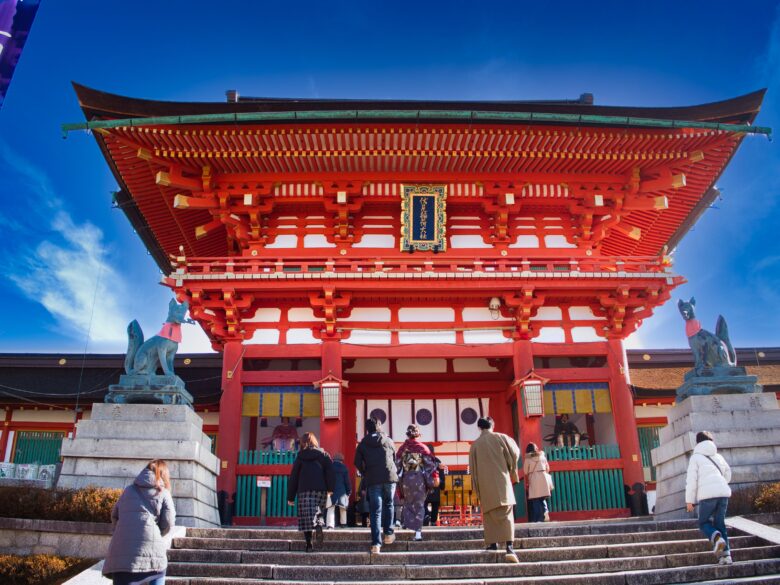
After the tower gate, five deities are enshrined together in the main shrine building which is designated as an Important Cultural Asset.
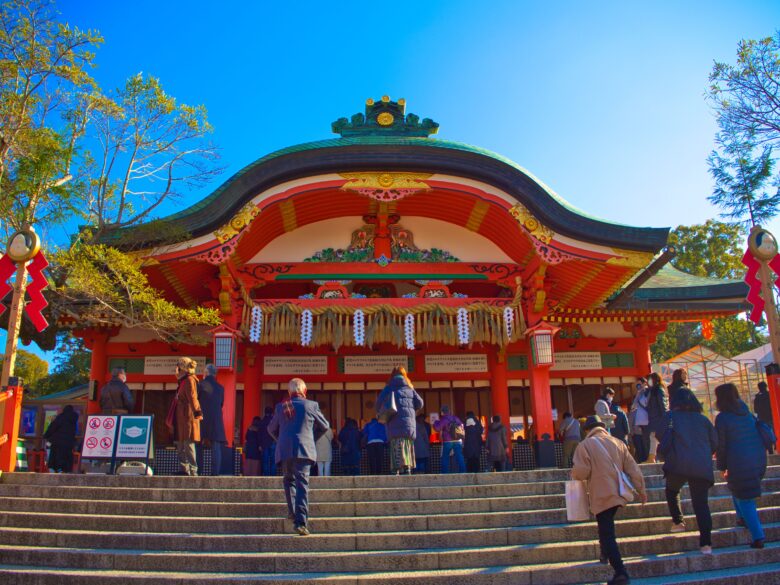
Main point for sightseeing “Senbon Torii”
To see the “Senbon Torii” you need to pass the main shrine. You can see many torii but that is still not the “Senbon Torii” so don’t mistakes. There is the display.
The entrance of “Sebon Torii” is right side and the left side for return.
After COVID-19 they change like this and in the past it was freedom.
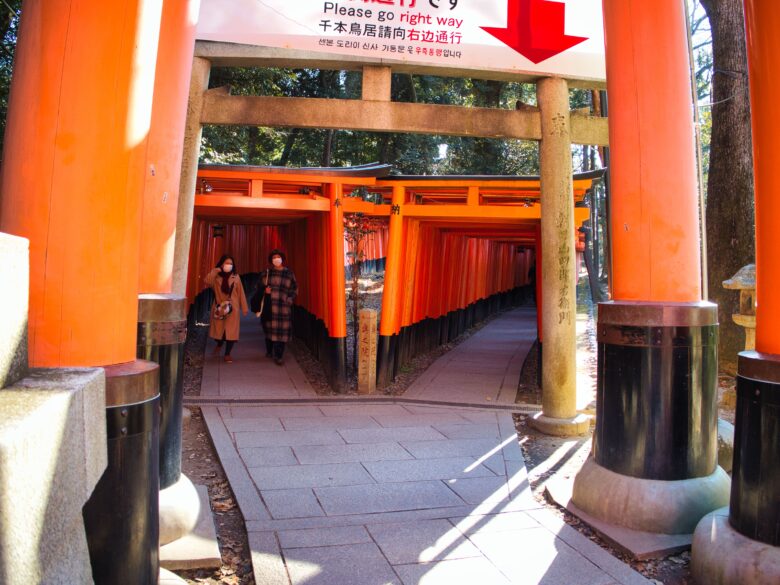
The view of beautiful bright red torri which is aligned nicely was really nice view and many tourists were waiting each turn to take a good photos there.
The reason why this place has so many torii is because during the Edo era, people believed that the dream would come true or become true could be enhanced by dedicating torii to the shrine.
And until now Japanese have believed this.
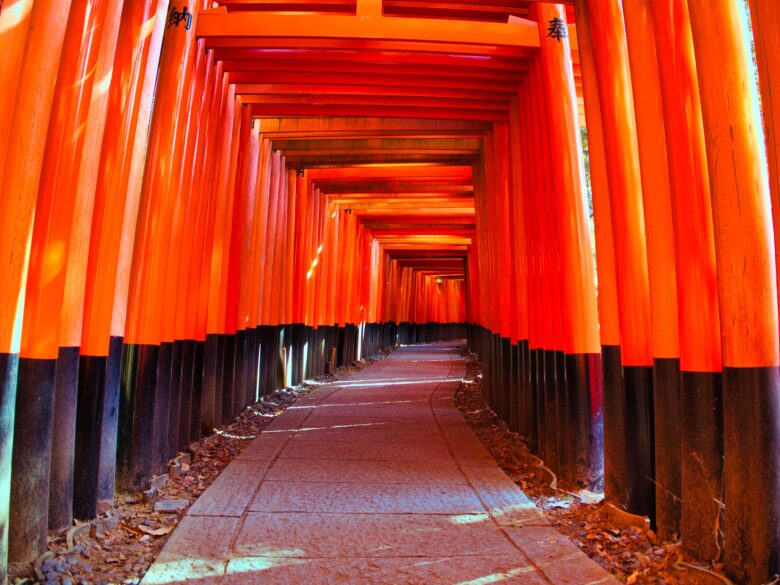
Another power spot which used to said that the dream comes true “Omokaruishi”
When you pass “Senbon Torii” you will arrive at Okusha Hohaisho prayer building. People come here to pray to the holy mountain Inariyama, which you can see three peaks from right behind the building.
There is a pair of stone lanterns in the back right-hand corner of Okusha Hohaisho which is known as “Omokaruishi”. Make a wish in front of the lanterns and pick up the top of the lantern (Kuurin). If the stone feels lighter than you expected, your wish will become true, and if it feels heavier, your wish will be unlikely to come true.
I raised and felt lighter than expected but the money I threw didn’t go inside the money box there… Hope my wish can come true haha.
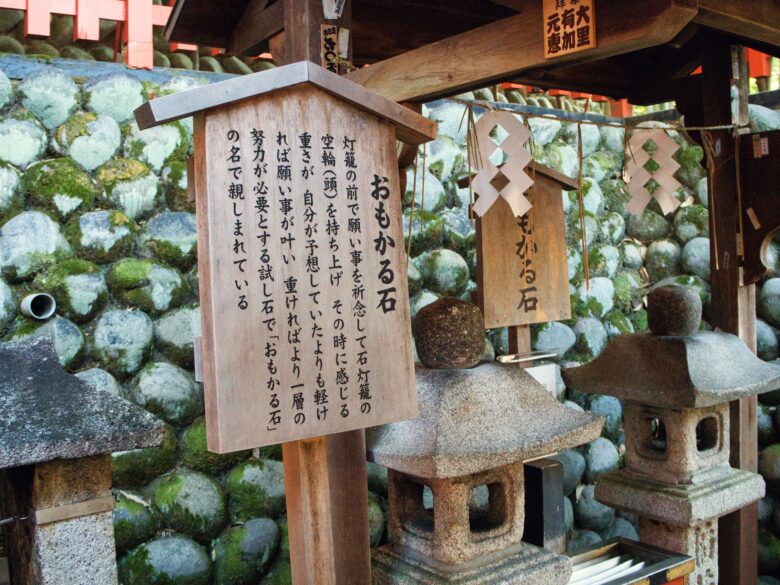
Make an effort to climb Inariyama!
In Fushimi Inari Taisha number of torii used is around 10 thousand. So inside Inariyama also there are many torii. Since the entire Inariyama, where the Inari Okami was enshrined, is the object of worship, Inariyama also has many beneficial mounds and attractions to see.
In the famous essay “Pillow Book” author Seishonago used to say that enshrined Inariyama. If you still have the energy to go up you should go.
Actually, I think too easy to climb Inariyama because it’s just a mountain inside the shrine but it was much tougher than I expected. One way is around 4km if you go to the top and many stairs are there. For me needed 2 hours to return back.
Better to use sneakers or trekking shoes and additionally bring a towel and water. I went there during the winter season but my jacket was disturbing me.
To buy water there is no problem you can buy it on the way to the top of Inariyama there are a few shops at each point and a few rest areas are also there. Souvenir shop is also there but you can buy at the entrance of Fushimi Inari Taisha. If you want you just need to buy the specific items which are related to each point small temple.
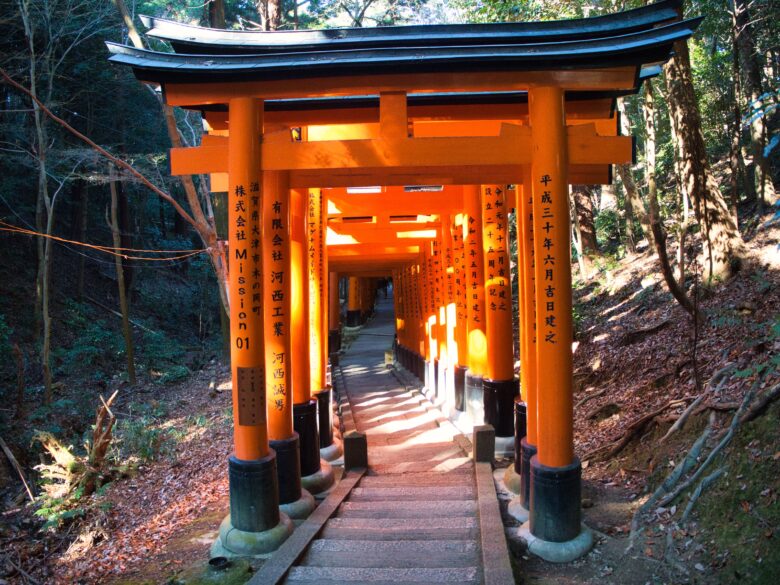
Inariyama is quite nice for walking because not so many people are there and because of this quiet environment you can feel something mysterious and also feel like you are in a different world. Other than that the combination of green trees and red torii won’t make you boring.
At Yotsutsuji you can see the southern part of Kyoto Panaroma. This area was quite many people.
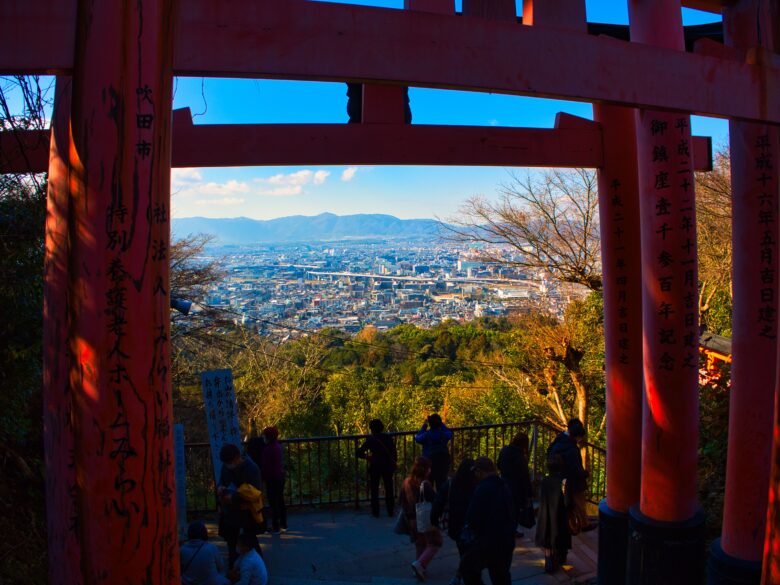
When you arrive at Yotsutsuji there are 2 ways to go forward. 1 is clockwise and another is anti-clockwise. Both of you will return back to Yotsutsuji. At this time I choose unite clockwise.
I thought the places you could rest in a good environment were Mitsurugisha and Kiyotaki. So if you want to rest first you (during your climbing up) should choose clockwise, if you want to rest later (during your climbing down) should choose anti-clockwise.
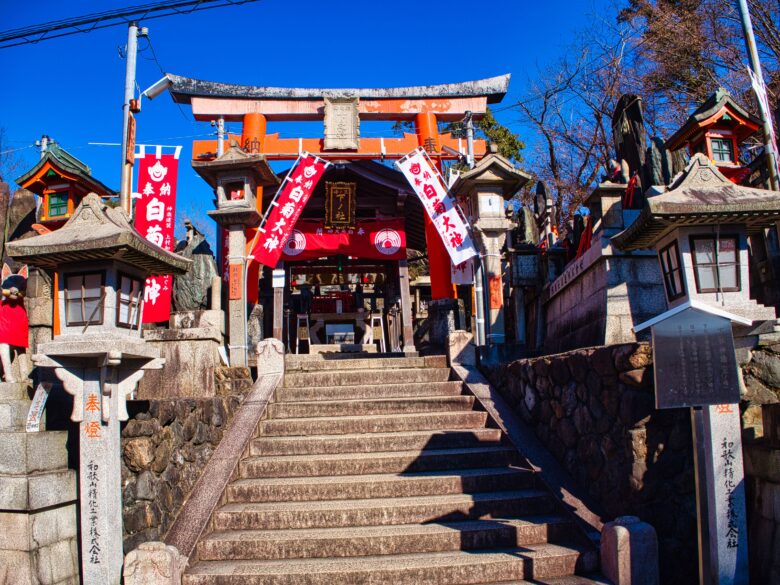
Suehiro Ohami is enshrined at Ichinominejosha. It is popular because it is auspicious as it means “spreading” and it is said that everything will be successful if you visit.
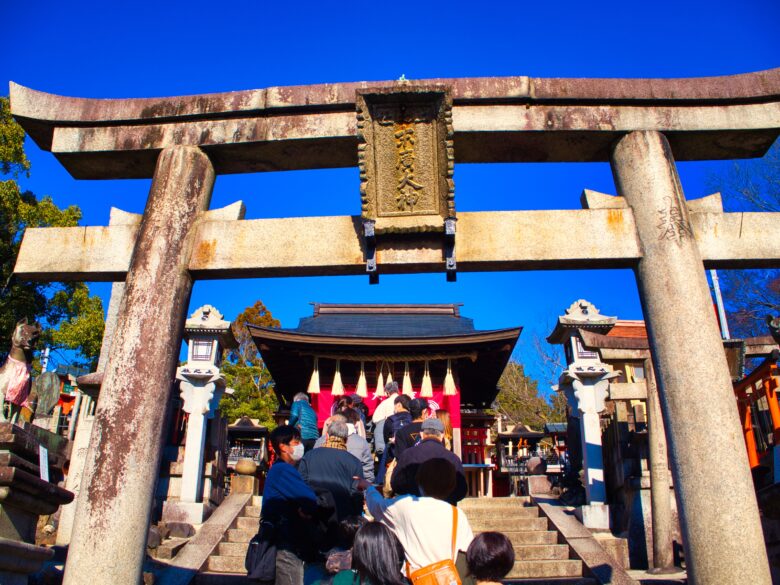
After Ichinomine you can see the temple which is enshrined the god of eyes “Ganrikisha” and the god enshrined as caught “Osekisha”, benefits of disease-free breathing “Yakurikisha”, and several places related to health is there. If you choose clockwise you will see this first.
The most attracted me was Ganrikisha which is the god of the eye.
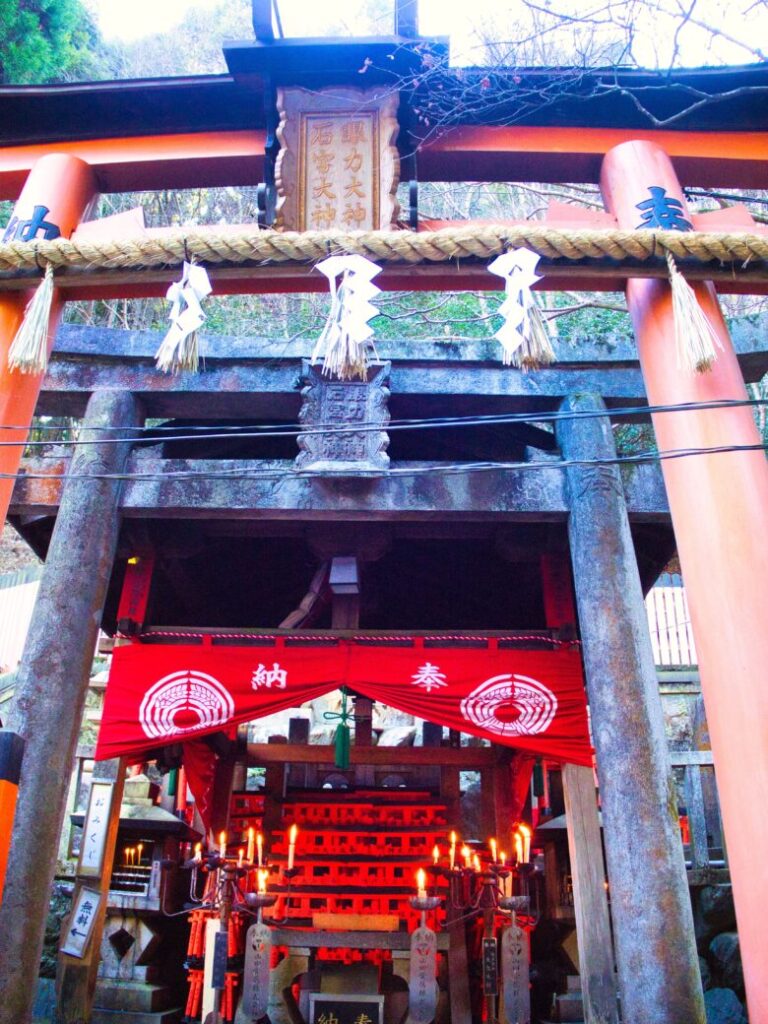
Mostly we will describe eye disease or poor eyesight. Of course, there are benefits to this but one I was interested in is “Gives foresight and eyesight”.
Whatever you do identifying the things is a very important and also important factor.
When you work, choose something, go travel, do sports, and so on everything you see with your own eyes and judge. If you gain the ability to see the essence of things, your vision will expand and the world in which you can play an active role will expand. It’s a deep mindset, isn’t it?
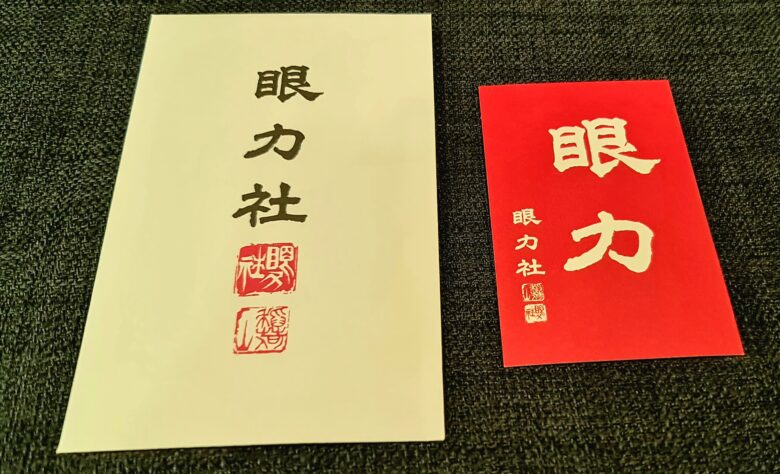
God of eyes is not many in Japan. My main purpose for here was to visit “Oinari san” so it was happy for me to get and earn additional things which I didn’t expect.
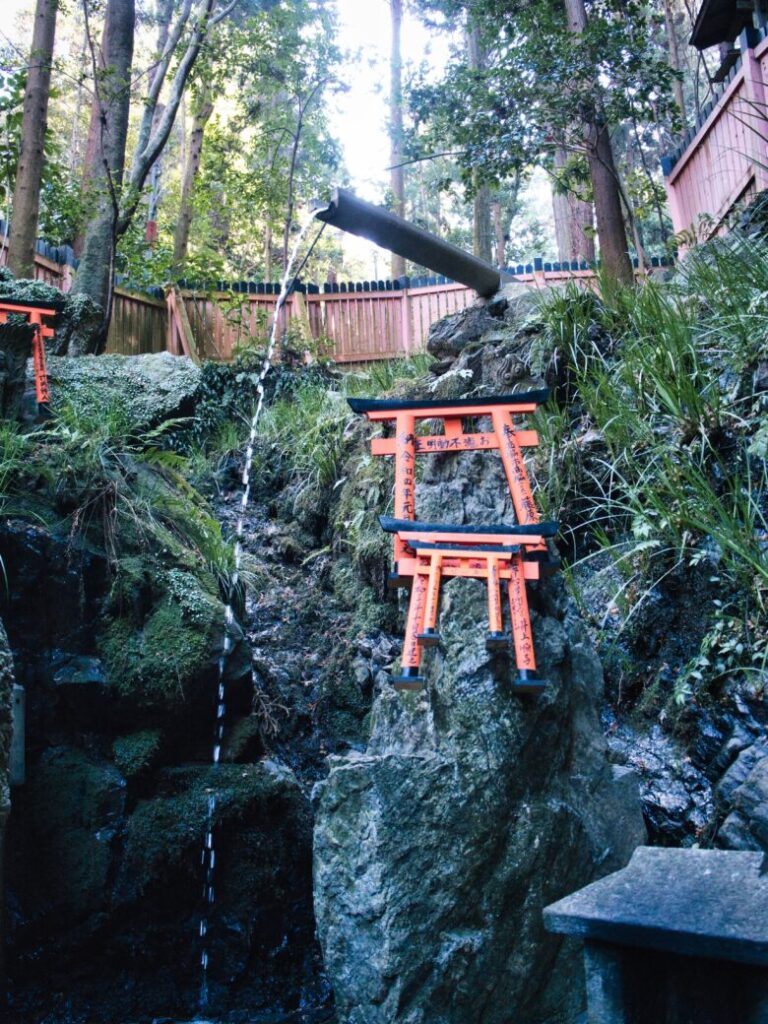
Summary
Fushimi Inari Taisha is very very well known because of “Senbon Torii” but actually other than that there are so many things to see and attract you.
Actually, I also only interested in “Senbon Torii” but when I went to Inariyama I impressed by how nice is Fushimi Inari Taisha.
Other than “Oinari san” many gods are enshrined. To find your interested god is also might be a good activity for this trip.
If you didn’t go to Fushimi Inari sightseeing will finish around 30 minutes.
Note for travller
If you have a big luggage such as suitcae you can storage at the locker at JR Inari station but the locker is not so big and not many, so you may not to use.
Most of the people need to change the train at Kyoto station it’s better to get off there and use the Kyoto station locker since it’s more big and there are many.
Address:68 Fukakusa Yabunouchicho, Fushimi Ward, Kyoto, 612-0882, Japan
Operation hour:24hrs open
Fushimi Inari Taisha official homepage
Japan offers a wide variety of sweets. You will probably have a hard time deciding which to buy: chocolate, candy, biscuits, or traditional Japanese sweets. Also, some are seasonal, which will make you even more confused.
There is a website that summarizes what is the best Japanese sweets, and we hope you will enjoy Japanese sweets with this website.
Japanese snacks lab
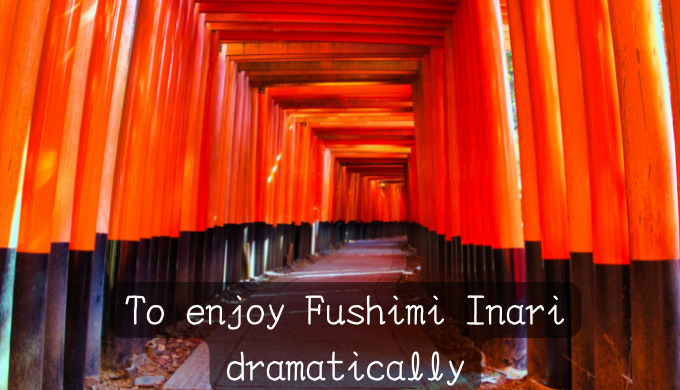
Comments